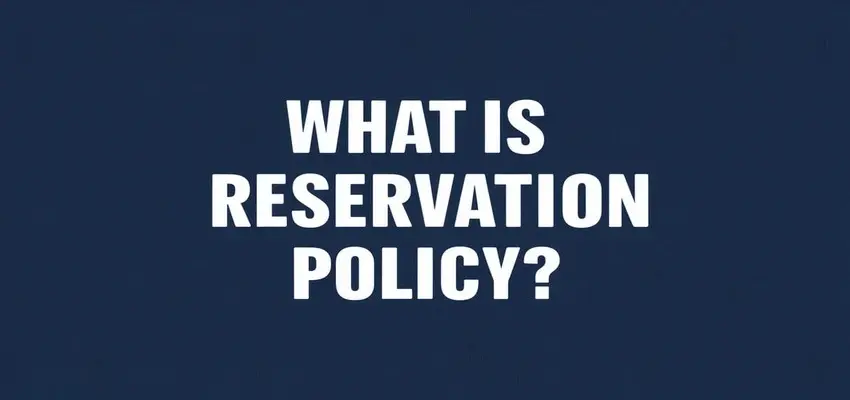What is reservation policy?

Reservation policy is the policy of India where the government gives stipends to the students belonging to the backward classes of Indian society.
India's reservation policy is a policy whereby the government of India uses a quota system to allocate a specific number of slots for members of the scheduled castes and tribes in jobs higher learning institutions and even the legislative body. The basic purpose of this policy of affirmative action is primarily to enhance the representation and socio-economic status of disadvantaged groups such as SCs, STs, and OBCs.
History and Background
Reservation policy began in India in the late nineteenth century with the British colonial government sought to provide special privileges to certain elements in the society to enhance the representation of certain backward classes in schools and employment. This was accomplished through non-statutory administrative orders.
In India, after gaining independence in 1947 the constitution made provisions for reservation through Articles 15(4) and 16(4) which enabled the state to provide special treatment for the backward people in social and educational fields. The first statutory order extending reservation was brought in later in 1943 by the British administration.
The coverage and the scope of the reservation have been extended now and then in the form of constitutional amendments and legislation. Some of the important steps are the Mandal commission report in the late 1980s that had sought to enhance the quotas for OBCs, the 93rd constitutional amendment in 2005 that sought to carve out space for reservation in private unaided institutions, and the most recent 103rd amendment bill which proposes to give 10% quota for economically weaker sections.
Current Reservation Criteria
The current criteria for getting reservation benefits in India are: The current criteria for getting reservation benefits in India are:
1. Caste and Community: Dalits, tribals, and OBCs can avail of Quota privileges as per the oppression and backwardness facet of the caste system. These lists of castes and tribes are notified from time to time depending on the ethnographic survey held.
2. Religion: Reservation benefits are not limited to any particular caste but are for all castes belonging to the Dalit category irrespective of religion. However, the non-Dalit backward classes called Other Backward Classes get the quota only if they are Hindus, Sikhs, or Buddhists.
3. Economic Status: The recent 10% EWS quota depends on the family income and the asset ownership they hold. It provides EWS reservation to those candidates with a family income below Rs 8 lakh per annum and having possession of 5 acres of agricultural land or less.
4. Special Provisions: Some of the conditions that may be included are domicile requirements, cut-off age, and so on may vary depending on the state. It is a general rule of reservation for women that is applicable in all categories.
Current Extent of Reservation
1. Central Government Jobs: Among the socially disadvantaged groups 15% for SCs, 7. 5 % for STs, and 27% for OBCs a total of 49. 5%.
2. Higher Education: That too only 15% for the SCs, 7. 5% for STs, and 27% for OBCs totaling 49. 5%
3. State Government Jobs: The percentage is slightly different depending on the state and ranges from 10% to 69% in different states of the USA.
4. Lok Sabha & State Assembly: From self-financed and management quota seats to the SC/ST reserved seats as per their population percentage in the state.
Ongoing Debates
There are many polarising perspectives, debates, and court cases associated with various aspect of the reservation policy: There are many polarising perspectives, debates and court cases associated with various aspects of the reservation policy:
- - Scarcity in achieving efficiency in minimizing backwardness after seventy years of independence.
- - Proportionate distribution of fellow students among various castes and communities
- - The efficiency criteria of economic versus social backwardness
- - Provision for fair quota in promotion in employment.
- - Regarding the ˜Creamy Layer' exclusion within the OBC quota, interested candidates can avail of the following benefits:
- - Caste-based census data required to be updated/compiled afresh
- - Revision of income limit for reservation in EWS quota
- - Facilities for reservation for Transgender persons, Disabled, etc.
- - Upward extension of coverage versus fixed 50% restriction set by the Supreme Court
Some of these issues are still often viewed as sensitive and provocative in the current Indian political context. However, almost all the analysts have held the view that there can be no solution that will be easy to implement or about which there can be consensus, taking into consideration the historical factors as well as the reality of caste and community politics in the country today. The future course will probably be seen as continued gradualism of fine-tuning for sensible political changes that incorporate social justice with economic rationality.
Call us at +1 833-902-2090 to secure the best deals on flight tickets today. Don't miss out on unbeatable prices for your next adventure!
